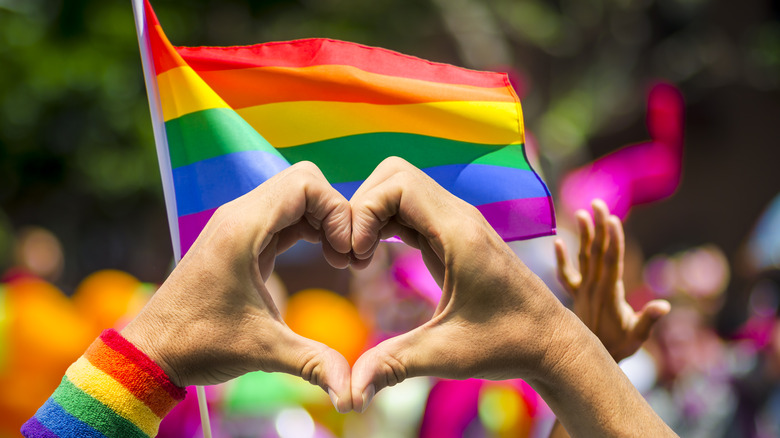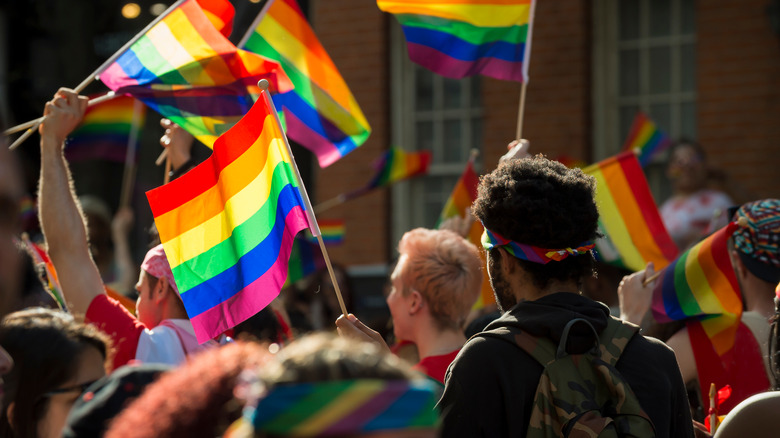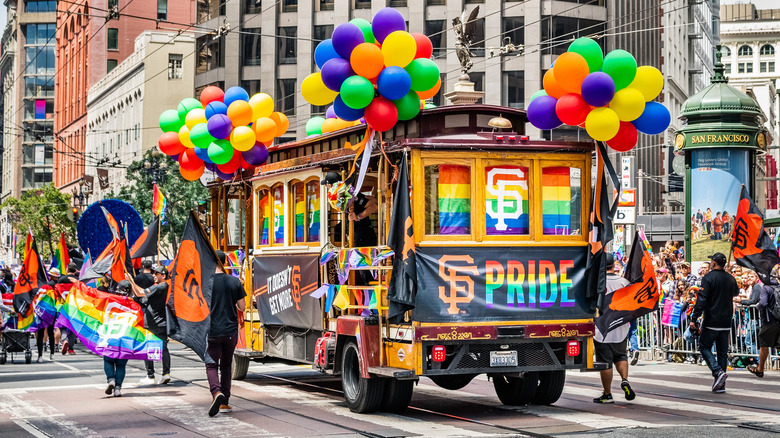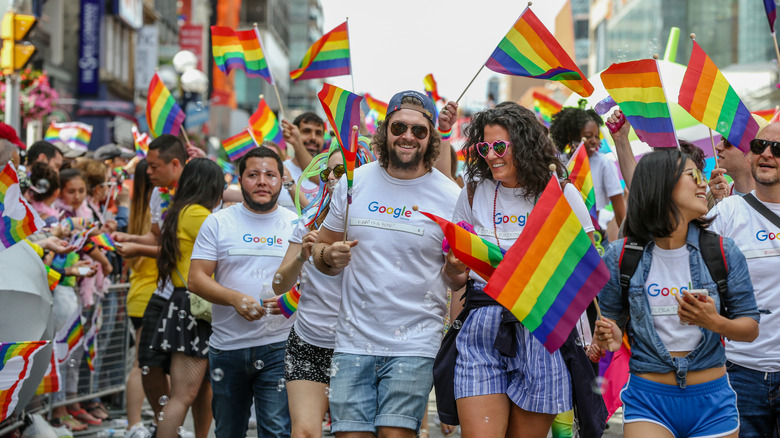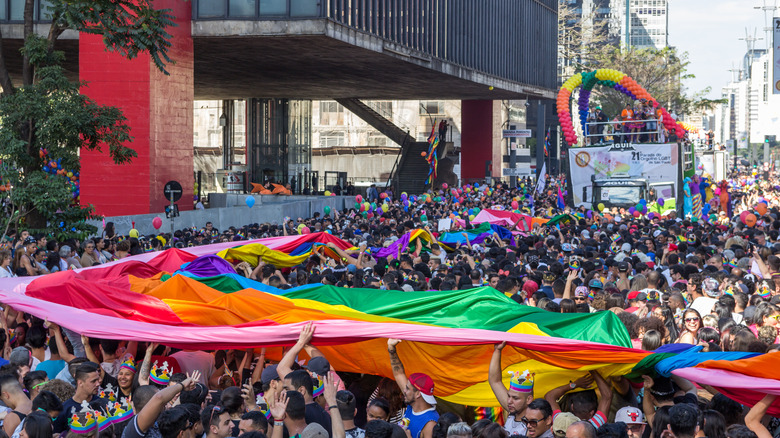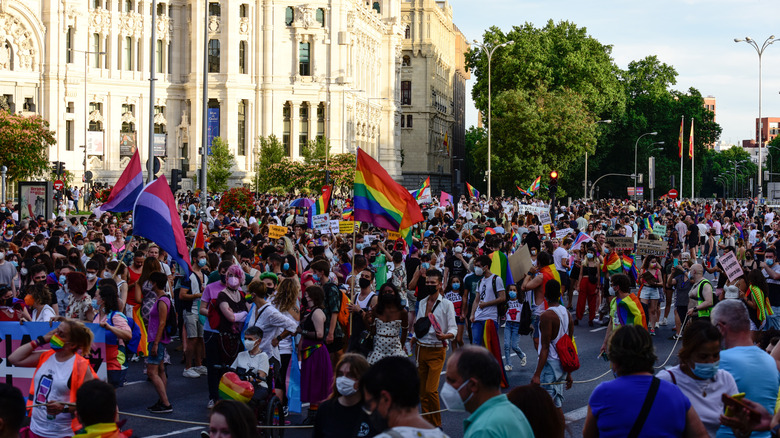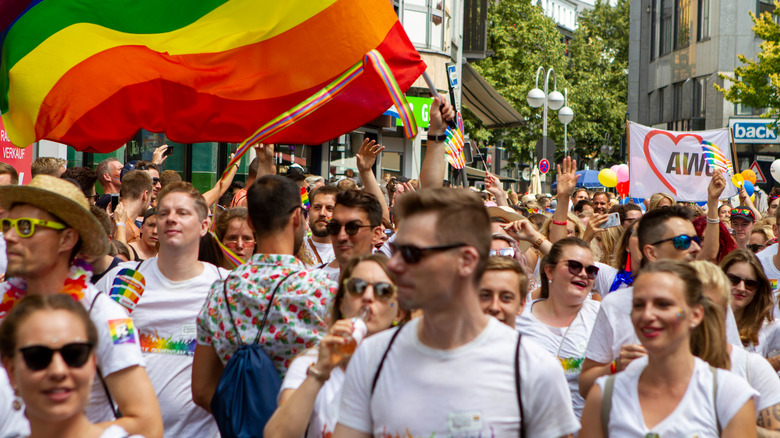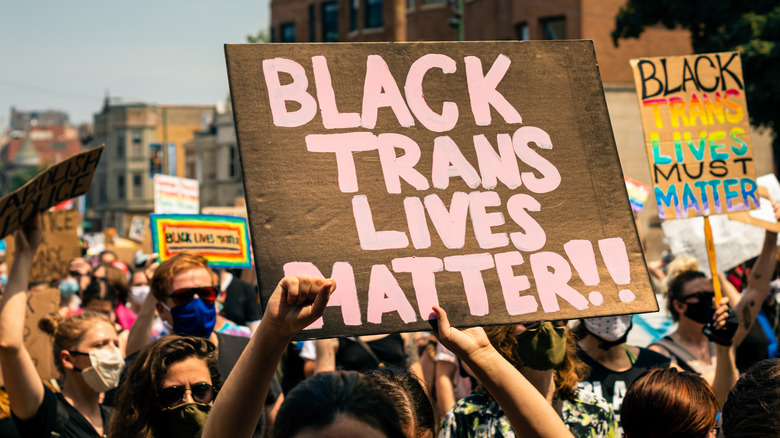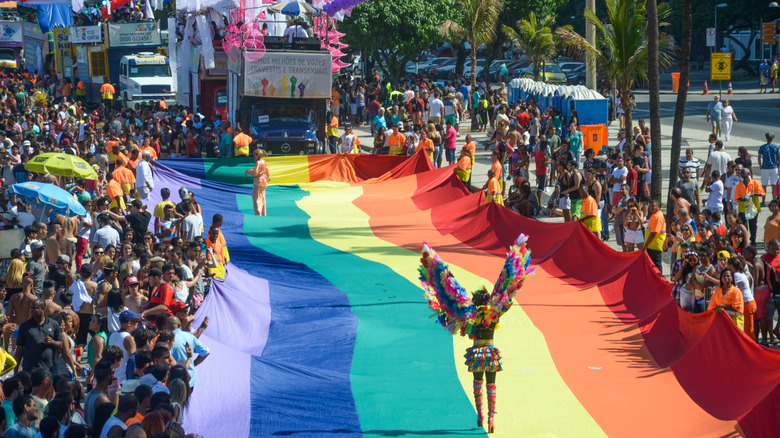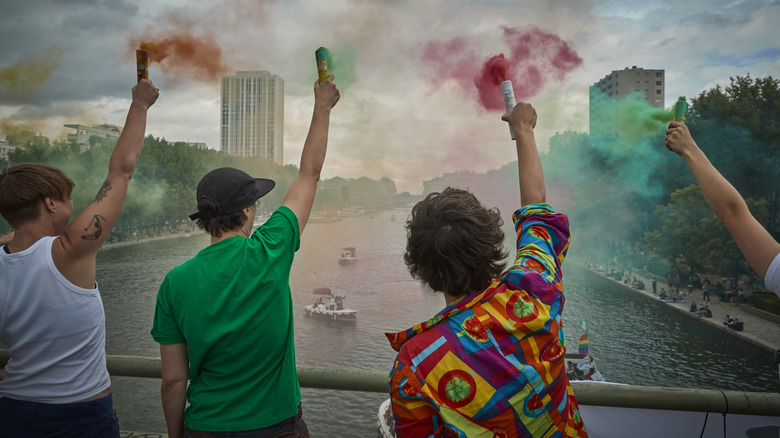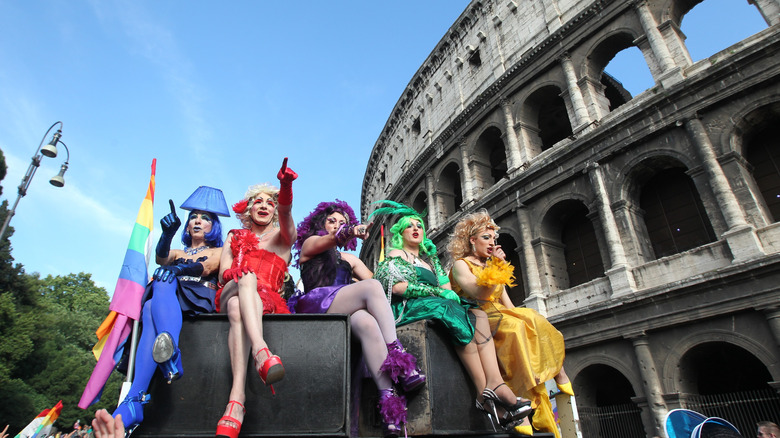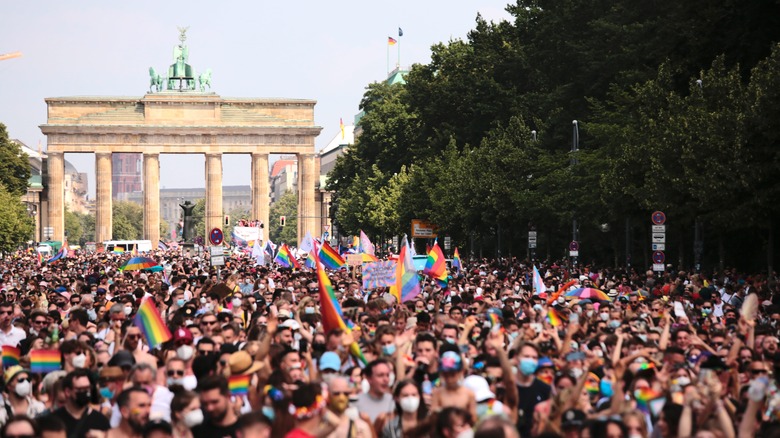12 Biggest Pride Parades In The World
Pride parades are just about the most colorful, vibrant, and diverse displays of acceptance and positivity you will ever see, with many occurring annually in major cities across the globe. But the tradition that began 53 years ago was quite the opposite: Without smiles or fanfare, several dauntless and unwavering men and women locked arms on Christopher Street in Greenwich Village, New York City, exhausted from repeated police raids and unyielding discrimination, per CNN. They wanted to drink, they wanted to dance, and they wanted to meet people like themselves, but America in 1969 found ways to make that impossible. So they decided to march in order to make themselves visible.
Most of the cities listed below began honoring the Stonewall riots and its subsequent march with parades of their own in the early 1970s. The number of spectators and participants has grown from tens of thousands into the millions. This list represents the largest numbers, but it isn't exhaustive. Many unexpected places have made remarkable strides in attendance; former Soviet states have formed Riga Pride (per Brookings), and Taiwan became the first East Asian country slated to host WorldPride for 2025 (per The Diplomat). But if you're looking for the biggest and best parties to insert into your bucket list, here are the 12 largest Pride parades across the world.
New York City Pride
Pride in New York City is easily one of the biggest Pride events in the world. In 2016, NYC Pride had a record number of 2.5 million participants. The event occurred in the immediate aftermath of the 2016 Orlando Pulse nightclub shooting, in which 49 people were killed. Pulse was a bar popular with the gay community. At NYC Pride, marchers wore white veils with pictures of the victims attached to their chests. They built a makeshift memorial for the victims and used the parade to protest gun laws, states the New York Daily News. Later, in 2019, NYC Pride had an astounding 4 million people in attendance. That year, NYC hosted the international event WorldPride, which brought visitors from all around the world, per CNN.
But 2019 also marked a special occasion — it was the 50th anniversary of the 1969 Stonewall Riots. In a country that was rampant with anti-gay legislation and a city that willfully reinforced them, Greenwich Village's Stonewall Inn was one of the few places in NYC where gay patrons could socialize on their own terms. Police raids at Stonewall were common, and if they were caught dancing, patrons could get arrested. On June 28, the gay community started pushing back against police raids, and riots erupted along Christopher Street, on which Stonewall is situated. A year later, activists formed the Christopher Street Liberation Day march, which later became the annual Pride parade, per CNN.
San Francisco Pride
Today, San Francisco Pride is a celebration that sees nearly 1 million attendees annually, but when it started in the early 1970s, the participants marched with a sense of duty and to little fanfare. It didn't take long, however, for the celebration to grow, and in 1973, the parade had nearly 42,000 visitors. At the time, it was called Gay Freedom Day. In 2020, they had a budget of $3.5 million and an expected attendance of 1 million people, notes the San Francisco Examiner.
In 2014, SF Pride had a record number of 1.7 million attendees, per Insider Monkey. The route for the parade usually runs along San Francisco's Market Street, and in 2022, it announced it was returning for the first time since its pandemic hiatus. Although there were concerns that the celebration would result in higher COVID-19 infections, the Pride weekend events reportedly garnered an estimated $357 million economic boost for the city, and small business owners are excited about its return. The 2022 celebration will take place on June 25-26 with a planned theme of "Love Will Keep Us Together," per CBS News.
Pride Toronto
Pride Toronto has marked its place on the map as one of the largest Pride events in the world. In 2012, it reached a record number of 1.2 million attendees. Its events include several marches — a Dyke March and a Trans March, alongside the main Pride parade, per Insider Monkey. Pride Toronto began in 1970 as a picnic gathering between several activist organizations with only 100 in attendance. In 1971, they formed the second annual march, and the following year saw increased and varied programming. Its first few decades experienced a lack of recognition and media attention, arrests, and police raids. They were repeatedly refused an official proclamation from the mayor, who controversially proclaimed an "Official Muppet Baby Day" over recognizing Pride Week. But by the mid-1990s, the number of parade participants reached six figures, and the mayor of Toronto began to make appearances, according to Pride Toronto.
Pride Toronto now is a major yearly event. According to its 2019 Economic Impact Report, its celebrations saw upwards of 1.7 million people that year. 30% of its attendants came from outside the city while 5% came from outside the country. It reported $149 million in tax revenue while creating 4,827 jobs. Like other Pride events around the world, it shut down events due to the pandemic but is gearing up for regular programming for the whole month of June, per Pride Toronto and CBC News.
Sao Paulo Gay Pride
Sao Paulo Gay Pride has become the king of Pride celebrations. It regularly competes with NYC Pride for the top spot, attracting a record 4 million visitors for its 2009 parade, and then 5 million for its 2017 parade. It previously held the Guinness World Record for attendance for its 2006 parade, which was then broken by the same parade three years later, states Insider Monkey. Sao Paulo's Pride parades have carried a special meaning in recent years. Violence against the LGBTQ+ community has been an issue in the country, and in the year of its groundbreaking 2017 celebrations, Brazil saw 160 LGBTQ+ members killed in hate crimes, per the BBC.
Its 2019 parade was also held in honor of the 50th anniversary of the Stonewall riots, however, it also came soon after far-right President Jair Bolsonaro's election. Bolsonaro once labeled himself a "proud homophobe," and said that he would rather have a dead son than a gay son. That year was a tough one for the LGBTQ+ Brazilian community; in less than six months, 141 LGBTQ+ members were either killed in hate crimes or died by suicide. They received a victory when Brazil's Supreme Court made discrimination against gay and transgender illegal, which Bolsonaro opposed. Parade organizer Diego dos Santos said 2019 was one of the most important parades they've had. Many of the parade-goers shouted anti-Bolsonaro chants, and the numbers ranged in the hundreds of thousands, according to NBC News.
Madrid Gay Pride
Madrid Orgullo is considered one of the best Pride celebrations in Europe — not only because of its numbers and vibrant community but also because of Spain's history of gay rights. After all, Spain legalized gay marriage in 2005, before many other countries, explains the travel site Culture Trip. However, in 2019, Spain's LGBTQ+ community became a target of the far-right Vox party, which opposed the hanging of a rainbow flag at Madrid's City Hall. They sought to undermine Madrid's Pride parades and curb gender and diversity lessons given in schools by LGBTQ+ activists, going so far as to request their individual names, per El Pais and Reuters.
As a result, Madrid's 2019 Pride celebrations — just like in Brazil — had stark political overtones. Right-wing and center-right parties that have cooperated with Vox on other issues were disinvited from the parade. Videos on social media captured verbal confrontations between members of the center-right Ciudadanos, who decided to attend, and other Pride attendees. The Ciudadanos had bottles and other objects thrown at them and were even halted by some protestors from moving forward in the parade and eventually forced to leave by police, per El Pais. An estimated 1.6 million people attended the parade that year, a number similar to the 2016 parade, per Insider Monkey. Madrid's 2022 celebrations will take place over the course of a week, from July 1-10, per Es Madrid.
Cologne Gay Pride
In 2019, Germany's largest Pride celebration drew more than a million people to the city of Cologne, while the year before saw 1.2 million people in attendance. Celebrities in attendance in 2019 included the Eurovision winner Conchita Wurst, the singer Haddaway, and Spice Girl Mel C. However, Cologne Pride prefers to maintain a protest-like atmosphere, deliberately capping the number of floats allowed in the procession. The 2019 parade embraced the political activism side of Pride, especially since gay rights remain limited in Germany. For lesbian married couples, only the biological parent is considered a parent, while the other parent is required to adopt, per DW News.
The 2019 celebrations also had to deal with the rising popularity of the far-right Alternative for Germany party, or AfD. The political party advocated changing Germany's marriage equality laws and wanted to limit the discussions of sexuality in schools. At the time, Germany saw an increase in homophobic hate crimes by 30%, notes DW News. The Pride theme that year was "Many.Together.Strong." Then in 2021, Cologne had its first normal parade since it was postponed in 2020. The strength of the city's Pride was evident since 10,000 visitors showed up, although it was in bad weather and limited due to COVID-19 restrictions. The 2020 Pride celebrations were delayed until October and consisted of a bicycle procession, per DW News.
London Pride
As one of the largest cities in the world, it shouldn't be surprising that London's annual Pride event is one to watch. Pre-pandemic, the celebrations brought in 1.5 million visitors in 2019. It featured performances from Broadway star Billy Porter and singer Becky Hill. Many celebrities have attended the celebrations, including singer Sam Smith, Sir Ian McKellan, Renée Zellweger, Kendall Jenner, and Bella Hadid. The 2021 Pride in London celebration was pushed back from its regular date in July to September due to the pandemic, according to Elle.
That year, Pride in London dealt with calls to ban the Metropolitan Police, including members of the LGBTQ+ community, from marching in the event in solidarity with Black Lives Matter. The organization rejected those demands. They faced a previous controversy in 2018 when Stonewall, Great Britain's largest LGBTQ+ charity, refused to fund Pride in London's events due to a perceived lack of diversity. Pride in London's community advisory board believed Pride in London wasn't inclusive enough, and the organization failed to assuage those concerns, per The Guardian.
Chicago Pride
Both the Chicago Pride Parade and Pride Fest will emerge from a pandemic hiatus on June 26, 2022. The parade will be dedicated in honor of Richard Pfeiffer, who organized the parade since 1974 and sadly passed away in October 2019. He was witness to Chicago's first Pride parade in 1970, per GoPride. Like perhaps many others around the United States, the event's organizers feel especially motivated in light of Florida's Parental Rights in Education Law, known to critics as the "Don't Say Gay" Bill.
Chicago's Pride events have long been popular. It reached around 1 million visitors in 2016, per WGN9. The previous year also saw an estimated 1 million attendees, where visitors celebrated a United States Supreme Court's decision that legalized same-sex marriage, per ABC7 News. Extra security was hired for the anticipated turnout. Chicago previously held an attendance record of 850,000 people in 2012 but has broken that record or matched it nearly every year since, per HuffPost.
Rio Gay Pride
Thousands of Brazilians gather every September at Rio de Janeiro's Copacabana beach to celebrate Pride. In 2018, the celebration's theme was "vote in ideas and not in people," in an effort to encourage Brazilians to vote for candidates who protected LGBTQ+ rights, per AP. After the country elected far-right politician Jair Bolsonaro as president, the 2019 Pride's themes consisted of democracy, freedom, and human rights. Attendees also protested Rio mayor Marcelo Crivello, who attempted to ban an Avengers comic showing two men kissing from a book fair. He ordered police to raid the comic shop that sold the book. Protestors responded by showing up at the book fair. However, Brazil's Supreme Court later overturned a lower court's decision to protect the ban, per The Washington Post. Crivello said his ban was an effort to protect children from sexual content, per AP.
Under Crivello, the city cut funding to Rio Pride in 2017. The organizers managed to secure private funding in time. The parade costs an estimated $200,000, half of which was financed by the city the year before. Brazil is responsible for the highest rates of hate crimes against LGBTQ+ members throughout Latin America, per AP.
Paris Pride
Paris Pride, or as it's known in France Marche des Fiertés, attracts around half a million people each year. LGBTQ+ demonstrations in Paris began in 1977, but its first parade started in 1981. Members of the French LGBTQ+ community have been afforded the ability to marry and adopt, along with protection from discrimination laws, but there are still limits to their rights. SOS Homophobia, a French awareness organization, reported 231 cases of physical attacks on LGBTQ+ members in 2018, according to journalist Courtney Traub in the travel site Paris Unlocked.
The festivities were canceled in 2020 due to the pandemic but resumed in 2021 with certain restrictions; there were no floats or stages for performances and concerts. The regular celebrations are planned to resume in 2022, with many LGBTQ+-aligned organizations participating, including trade unions, organizations dedicated to fighting and preventing HIV and AIDS, human rights organizations, and for-profit communities that have given support, according to the parade's planners Inter-LGBT. The main march occurs on June 25, but there are other themed parades in Paris and other cities across France. On May 14 there was a planned march in Paris for trans and intersex people, called "Exis TransInter," and according to French magazine Têtu, this year's slogan is "We aim for autonomy, not survival."
Europride
Europride is a pan-European event that chooses a different European city every year to hold a Pride parade. This usually gives a city an opportunity for optimum Pride exposure, especially if their regular Pride events are typically small. In 2011, the event brought an estimated 1 million people to its festivities in Rome, which featured a performance from Lady Gaga at the ancient Circus Maximus. At the time, it gave Italians an opportunity to criticize the Vatican and the country's conservative policies, per DW News, and although Madrid usually garners large numbers, its 2007 Europride event had a whopping 2.5 million visitors, per Insider Monkey.
Europride was first celebrated in London in 1992, with an attendance of over 100,000 people. The 2021 celebration took place in Copenhagen, Denmark, and this year's festivities will be hosted by Belgrade, Serbia. Belgrade has had a rocky history with Pride. Its first celebration occurred relatively recently in 2001, and the few that participated were received with hostility, per Europride. Host cities are voted on by ballot by the Europride Association, and Belgrade won the honor with 71% of the votes, per Europride.
Berlin Pride
Berlin Pride is another major Christopher Street Day (CSD) event in Germany. It began in 1979 and now regularly sees around 1 million people attend. In 2021, activists felt that the state of LGBTQ+ rights under attack in Poland and Hungary had an impact on Germany, especially with the rise of far-right political parties, per Euro News. In 2022, Berlin CSD is focusing its attention on women, lesbians, intersexual people, trans people, and asexual people, with plans to showcase issues exclusive to these communities with a film festival. It is also focusing on issues of faith, religion, and spirituality and will give a platform to religious members of the LBGT community, per CSD Berlin. Its motto for 2022 is "United in Love! Against Hate, War and Discrimination," per CSD Berlin.
Bernd Gaiser was a founding member of CSD Berlin in 1979, which was attended by 500 members of the LGBTQ+ community. In an interview with Zeit Online, Gaiser said that the German public was initially hostile to LGBTQ+ demonstrations in the early 1970s, but by the time official CSD celebrations took place, more people were willing to listen. But, he recalls a time when school teachers were fired after coming out as gay, and he and other activists organized to fight that kind of discrimination for nearly two years until it was finally criminalized by a German court.
